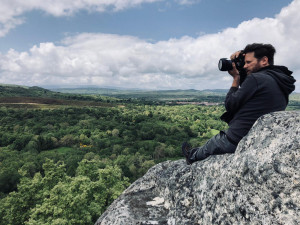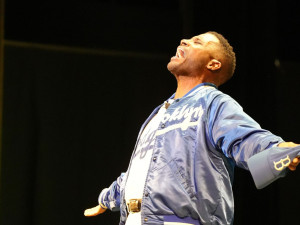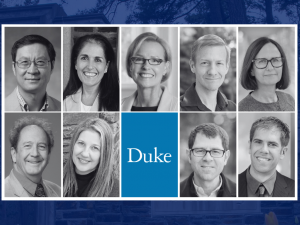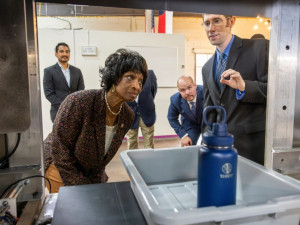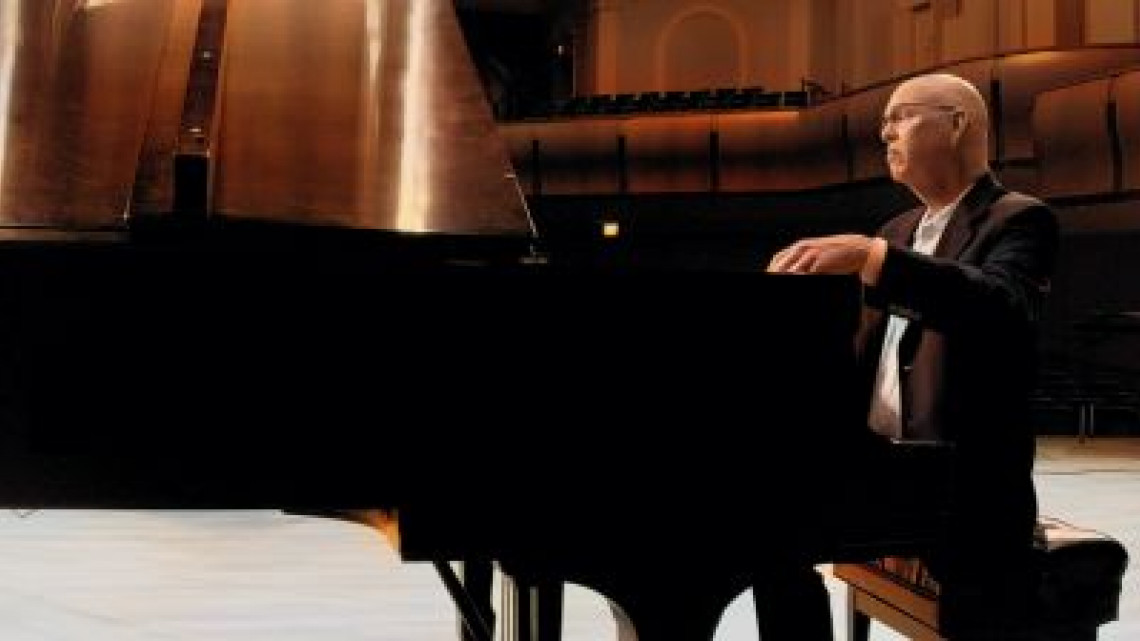
Celebrating 30 Years of Music and Mentorship: An Interview with David Heid
This year marks a special milestone for Duke's Department of Music as David Heid celebrates his 30th year on faculty. Known for his dynamic presence in the classroom, on stage, and behind the piano, Heid has been an inspiring force in the university’s musical community for three decades. In this in-depth interview, Heid reflects on his journey to Duke, his teaching philosophy, and what keeps him inspired after all these years.
A Career in Harmony
Q: What is your current job title?
D. Heid: I’m not really sure what my job title exactly is these days! One of the great things about working at Duke is that they have allowed me space to grow and change, and with that, my job titles and responsibilities have evolved. I think of myself first as a pianist, but now I am most recognized as the Director of Duke Opera Theater. I am also on the piano faculty and still accompany/coach a few voice students each semester.
Q: What’s the most surprising or unusual job you’ve ever had?
D. Heid: Like most musicians, I’ve done some crazy stuff to make a living. Washing dishes in a high-end Italian restaurant was the smelliest, and the one that would surprise people most, I think, would be playing the piano at a big comedy club in NYC.
The Early Years
Q: What first drew you to music and piano?
D. Heid: There was music in my house growing up. My mother was an English teacher but loved music and enjoyed her records. My oldest brother (11 years my senior) went to college to be an opera singer. Famous family lore — he used to listen to the Saturday afternoon opera broadcast from the Met. He would hold me in his lap and say, “One day you will love this.” True story. And he was right. It makes me tear up a little telling that story.
Q: Who influenced you the most in your early musical journey?
D. Heid: I have to say, early on, the people at my church and in my public school. There were mentors at both places who noticed me and my passion and gave me both encouragement and opportunities. I grew up in a small steel town 30 miles from Pittsburgh, and classical music wasn’t a common or popular pursuit. To have people see me and support me was more important than I could have realized at the time.
Q: How did your path lead you to Duke?
D. Heid: I moved to NC after a decade in NYC, where I did quite a bit of freelance work and was on the staff at the Juilliard School for a bit. I was ready for a change, and a family member down this way was ill. Duke was looking for someone to accompany some voice lessons, and I was not only looking for work — vocal playing/coaching was the real heart of my career at that point — I was a natural fit
Q: What were your first impressions of Duke?
D. Heid: As I am today, I was impressed at how many students invested so much time and care into their music, even if it wasn’t actually their major or life goal. Duke is impressive on so many levels, from the beauty of the campus to its famous academic rigor. It’s a bit awe-inspiring. The best advice I got when I moved to the Triangle was to pick a basketball team to support. The friend who gave me this advice said that even if you never watch a game, it will come up quickly in casual conversation! I took that advice to heart and started supporting Duke basketball.
I figured a paycheck should buy at least that much loyalty. Over the years, I’ve become a true Duke basketball fan, even being fortunate enough to wrangle tickets to games at Cameron many times. So, if anyone reading this needs to dump some free tickets next season, you can find my email address online!
A Philosophy in Practice
Q: How has your teaching philosophy evolved?
D. Heid: I have always thought that every student can learn and improve. That has never changed or evolved. The evolution has come from my improvement at helping students blossom. I have a larger toolbox to apply in lessons. I’ve also learned to talk slower and take more time. My personality is to try and do/fix everything in the first meeting. Some students respond to that approach, some do not. I’m also better at picking students from the audition process who I will work with successfully.
Q: Beyond technical skills, what do you aim to teach your students?
D. Heid: I really try to instill in my students a love of the art form and the repertoire. While I might not produce many professional opera singers in Opera Theater, I hope that some of my students will choose to attend the opera on their own after leaving Duke. Piano is such a lifelong pursuit. The piano is one of the rare instruments that can be very satisfying on its own. If I can get a student to a certain skill level, they can learn new pieces on their own and continue playing their entire life.
Q: How do you approach mentorship?
D. Heid: I try to meet them where they are and remember what a mess I was as an undergraduate. Patience and kindness go a long way in this world. I don’t think any musician plays their best when they feel attacked or threatened. We all need space to bloom, and the physical needs of singing or playing an instrument require the body to be loose, free, and open.
Milestones and Music
Q: What special projects have you led at Duke?
D. Heid: I love this question. One of the many treats about working in this environment is the chance to produce concerts without the stress of necessarily selling tickets or making money. When the recent and large number of Florence Price manuscripts were discovered, I put together a department-wide Florence Price concert that drew a huge crowd. The Duke Chorale, Ciompi Quartet, and countless faculty members appeared. It was quite a showcase not only for her gorgeous work but also for our musical community. The heart of my career has been in vocal music and especially opera. Coming out of COVID-19, I was joined on stage by eight wonderful opera singers from across the region to perform arias and ensembles. Recently, I performed Mozart’s “Ch’io mi scordi di te” with the Duke Symphony Orchestra. It was a fun late-career challenge for me. It’s the type of solo playing I don’t have the opportunity to present much anymore, and DSO conductor Harry Davidson is a close friend, which made the experience even more special. Oh, and many years back, I presented Schumann’s two big song cycles about love/loss – “Dichterliebe” and “Frauenliebe und-leben” in a single evening. It was a fascinating and exhausting experiment!
Q: How has the Duke music community changed over the years?
D. Heid: I have the sense that the energy in the department is higher than it’s ever been during my time at Duke. While there might be some quantifiable ways to measure this, there is just a vibe that is emerging in Biddle that is healthy and exciting. The faculty is all very professional about their work, but when the students are showing such passion, you can’t help but up your game as an instructor.
Reflections on Three Decades
Q: What has kept you inspired for 30 years?
D. Heid: The easiest question yet — my students! They keep me young and inspired. I survived the COVID-19 pandemic because my students were always so present and enthusiastic about their music. They truly kept me going. For many of them, my class was the only one on their schedule that was meeting in person, so that human connection was special.
Q: What are you most proud of?
D. Heid: I still love what I do, I still look forward to coming to make music and teach, and I am still learning as a teacher. I’m proud of the students who still keep in touch and continue to make music in their own way in their own corner of the universe.
Q: Any major lessons learned?
D. Heid: Never say never, and if you are open, your life might be greater and more varied than you ever imagined.
Looking Ahead
Q: What’s next for you?
D. Heid: Immediately on the horizon — I’m producing a big concert in September. In addition to this being my 30th year at Duke, it is also my 60th year on the planet! To mark these two concurrent milestones, I’m doing a concert of my favorite music with some of my favorite people. Some professional collaborators, former students, current students, colleagues….I’m pretty excited to have everyone coming together with me for this special moment in my life. Otherwise, I’m starting to think about what the next chapter of my life might look like after a lengthy career at Duke. I want to transition away from Duke before I lose my passion, energy, and ability to connect with my students. That isn’t right now, but the day will surely come.
Q: Any advice for aspiring music educators?
D. Heid: Work hard and always be your best. I can’t tell you how many times I’ve had a minor or insignificant gig, but someone important happened to be there, and it’s led to more lucrative work. I’ve earned a reputation, I hope, for always being the best I can be. And contrary to popular belief, you can be successful and get ahead while still being kind and supportive to colleagues.
Final Thoughts
D. Heid: I would just say thanks to the people at Duke and Duke Music for taking a chance on me and giving me so many extraordinary opportunities over the past 29 years.
As David Heid reflects on three decades at Duke University, his legacy is marked not only by his dedication and accomplishments but by the quiet strength with which he has shaped the institution and the lives around him. His unwavering commitment has left an indelible imprint on Duke’s community.
Congratulations, David, on accomplishing thirty years of excellence!


